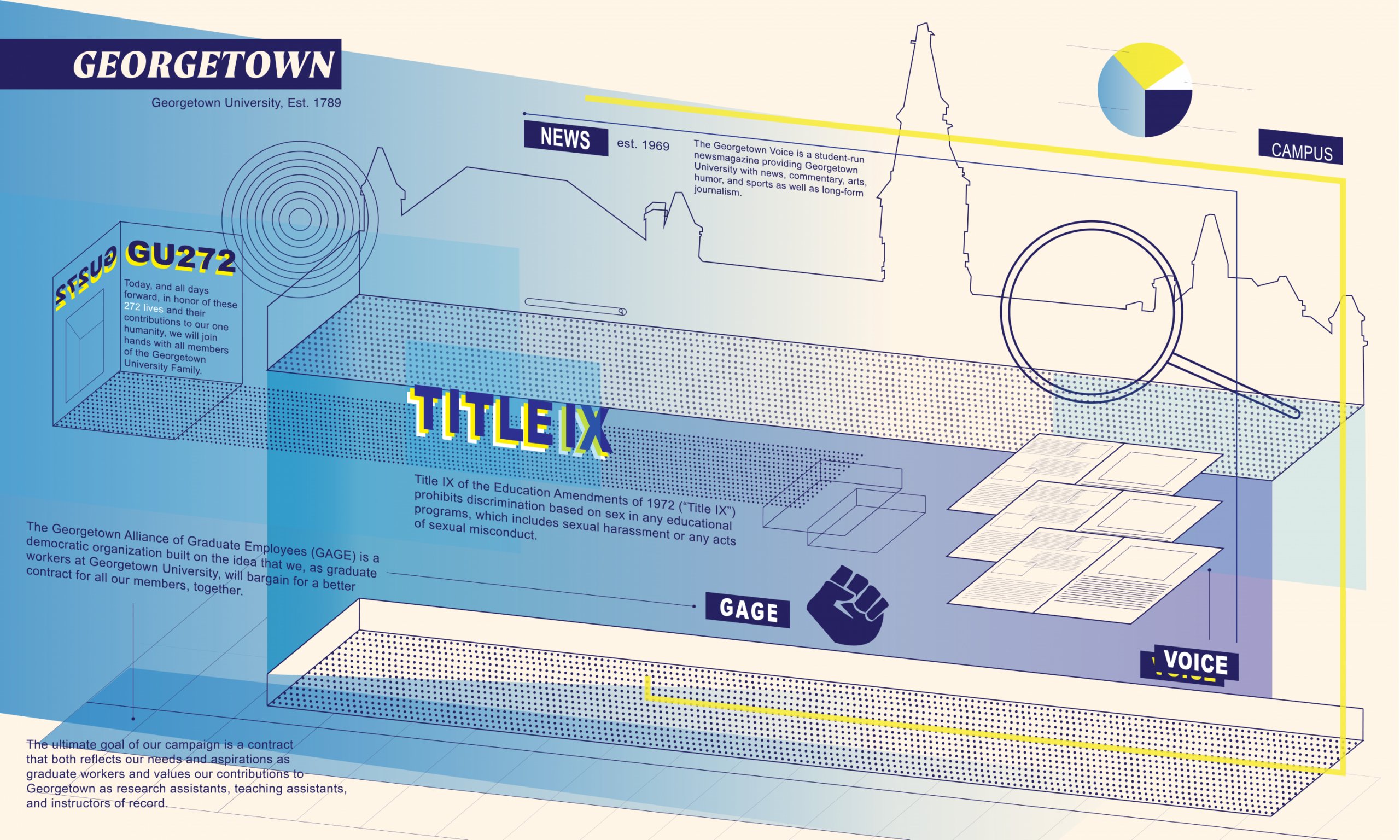This article is part of a series of explainer pieces by the Voice on some of the most important topics on campus. Other articles in the series can be found here.
Georgetown University does not currently host a Latinx Studies program, despite student interest in studying the history, culture, and injustices faced by the group, which makes up the third-highest demographic of undergraduate students, though do they offer a Latin American Studies program.
The proposed program would focus on the experience of Latinx individuals in the U.S.
The push for a department of Latinx Studies has been surrounded by similar asks for expansion of the African-American Studies department, and the creation of Ethnic Studies and Asian-American Studies departments. Though these new units have not been created, the advocacy around these departments has caused important changes to university policy.
Who has it, what does Georgetown have
Many of Georgetown’s competitor institutions have Latinx Studies programs. These include Columbia University, Northwestern University, and New York University.
The university has shown support for ethnicity and race-based academic curricula in the past, such as the creation of the African-American Studies Department in 2016. However, to date, there is no undergraduate major specifically centered on the experiences of Latinx people in the U.S.
Students may acquire an undergraduate minor in Latin American Studies through the Center for Latin American Studies (CLAS), and students in the School of Foreign Service who major in regional and comparative studies can select Latin America as their region. However, these options are more focused on regional and comparative studies of Latin America, though students can incorporate elements of Latinx Studies into their coursework and theses, according to CLAS Director Matthew Carnes, S.J.
CLAS, which Georgetown opened in 1959 in the aftermath of the Cuban Revolution, also offers a graduate program, billed as a “rigorous, interdisciplinary graduate program, designed for students pursuing careers in government, business, and international organizations in the U.S. and abroad.”
Engaging Difference
For years, student groups on campus, such as Movimiento Estudiantil Chicanx de Aztlán de Georgetown (MEChA), fought for a diversity requirement for all university students. This fight began in 1991 when a Subcommittee on Cultural Diversity in the Curriculum found in a report that “To continue to produce leaders in a complex world, Georgetown College must equip its students with a complex understanding of how the world works, now.”
In 2001, a formal request for a two-class diversity requirement was made by the Committee on Diversity in the Undergraduate Curriculum. This proposal was then rejected by the College Curriculum Committee who said that this would place undue pressure on certain departments and that “It would be almost impossible to obtain a Georgetown degree without having engaged in at least some classes which explicitly dealt with issues of pluralism,” so a requirement was unnecessary.
University President John DeGioia and other members of the administration created the Initiative on Diversity and Inclusiveness in 2009 and updated it in 2010. One of its main commitments was to “explore creating new programs” in the areas of African American, Latinx, and Asian American Studies.
In September 2012, the Cura Personalis Initiative (CPI) was created in order to address issues of diversity on Georgetown’s campus. Groups such as MEChA, Georgetown Solidarity Committee, and Hilltop Tacos helped found CPI. They first pursued an interdisciplinary minor in race, cultural, and ethnic studies in America. When this movement failed, the group pivoted to a two-course diversity requirement for all incoming Georgetown students.
The Last Campaign for Academic Reform was billed as the final push for new diversity requirements. In 2015, the campaign worked with Provost’s Office’s Diversity Working Group to create the Engaging Differences diversity requirement that students know today, with a global and domestic diversity requirement. Georgetown’s Main Campus Executive Faculty approved the addition of a diversity requirement to the core curriculum in the spring of 2015. The class of 2020 was the first class on the Hilltop to be held to this standard.
At the time, Randy Bass, then-vice provost of education, “attributed the success of the most recent attempt to exceptional student organization, the ongoing conversation about Georgetown’s past, and the creation of a new core curriculum committee.”
At the current time, there is a long list of classes that can be cross-listed with these diversity requirements.
The future
Due to the coronavirus pandemic, there is a murky near term future for a Latinx Studies program. However, this does not mean progress has stopped. In their pursuit of an Asian American Studies program, the Asian-Pacific Islander Leadership Forum has also advocated for new Latinx programs.
Additionally, the Department of History and the American Studies program have recently hired two professors of Latinx History/Studies. “For more than two decades, students and faculty have advocated for an increased attention to Latinx Studies at Georgetown,” director of the American Studies Program Brian Hochman wrote in an email to the Voice. “Now we finally get the opportunity to heed their calls.” Mireya Loza, the former curator at the Smithsonian National Museum of American History, will be teaching Latinx Social Movements. Mike Amezcua, a specialist in urban studies, will be teaching US Latinx History. According to Hochman, Loza will be working in a joint position between the American Studies Program and the History Department, while Amezcua has been appointed solely to the History Department.
“Profs. Loza and Amezcua are two of the most creative and exciting scholars in the field, true superstars,” Hochman wrote. “With their arrival, Georgetown becomes a leader in the study of Latinx life in the US–and at a moment when debates about immigrant rights and racial justice seem more urgent than ever.”
Read more
- Latinx Identity in the Georgetown Classroom
- Panel discusses diversity requirement for incoming class
- Students stage sit in to support ‘Engaging Differences/Diversity’ curriculum proposal
- The Final Push: An ongoing struggle for an academic diversity requirement
Editorial note: An earlier version of this article mistakenly identified Latinx Studies as Latin American Studies and incorrectly defined the role of CLAS. We apologize for the error.






[…] instituto está interesado en aprovechar los programas actuales de Georgetown dedicados a beca de América Latina y se centrará en los intereses económicos, políticos y sociales de la […]